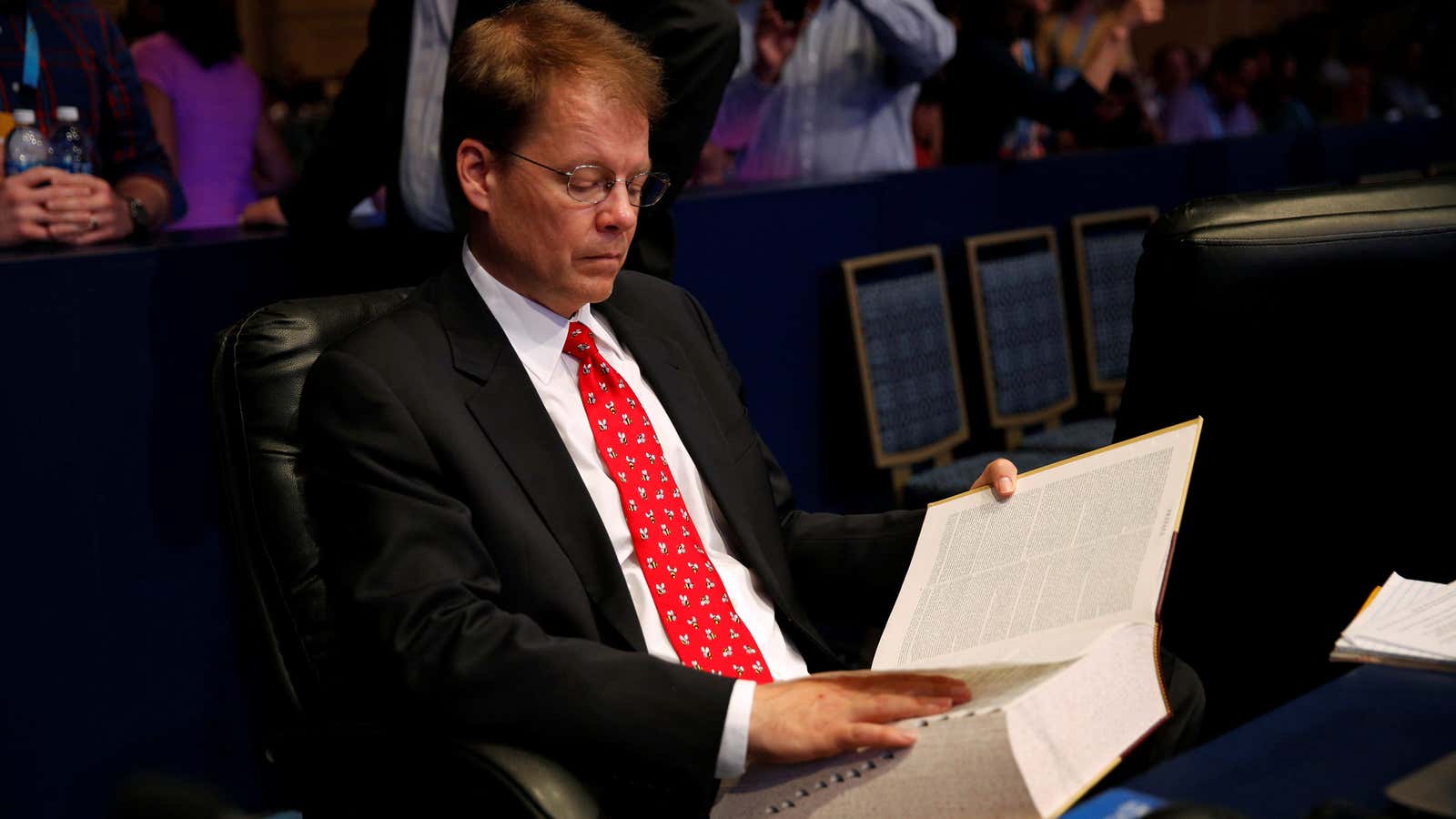Usually, end-of-the-year lists say what was “best” from that year. Best albums. Best books. Best bloopers.
These lists can be a little too optimistic for our taste. After all, a year is made up of just as many “worsts” as it is “bests.” So here we’ve compiled not the best, but the worst words of 2017. It’s good to reflect on the positive, of course, but you learn more from failure than you do from success.
Let us resolve to avoid all of these words in the year to come.
12. light-touch approach
This term appears to have been invented by Ajit Pai, chair of the US Federal Communications Commission. He used it to describe the type of regulation that would replace net neutrality following its repeal. This term is a handy way to justify to normally free-market Republicans the introduction of more regulation.
11. dotard
Kim Jong-un used (paywall) this antiquated insult to poke fun at Donald Trump. The word itself has a kind of nice quaintness, but it does not belong in diplomacy.
10. youthquake
For some reason, Oxford Dictionaries made this their word of the year. Fortunately, nobody uses it anyway.
9. snowflake
“Snowflake” began as a way for right-wing internet trolls to criticize left-wing internet trolls for being overly sensitive “unique snowflakes.” It has come to mean something like “crybaby,” and like many “cool” internet terms, originates from Fight Club. The term has become so common as to be meaningless; anyone who disagrees with you, left or right, can safely be called a “special snowflake” for being offended by your view.
8. everything
In 2017, everything was “everything.” This old clip of Lady Gaga shutting down a sexist question. This UFO chicken coop. This pig. Timing, however, still really is everything.
7. aporofobia and “low-end population”
These two together signify the way inequality is entering lexicons worldwide. “Aporofobia” was named Spanish word of the year, and means “rejection of or aversion to the poor.” Meanwhile, in China, “low-end population” was first used by the government to describe the relatively poor migrant workers it wants to remove from Beijing. The phrase was adopted by internet users as a critique of this policy, before being swiftly scrubbed from the web by censors. Neither should need to exist.
6. Nambia
The non-country that Trump said (paywall) had an “increasingly self-sufficient” health system.
5. wellness
Rich people, apparently, don’t feel well. The cure is “wellness,” a set of expensive placebos and unscientific practices that make you more… well. (It is not to be confused with “health,” which can be measured.) Because it’s not clear what wellness actually is, purveyors of such products—like both Infowars and Goop—get to hide behind the “wellness” veneer. Let’s use something more specific in 2018.
4. “Steve Jobsing it”
This is how former Uber CEO Travis Kalanick has described his ouster from the company he founded. The implication, of course, is that he will return to lead the company he created, triumphant and stronger than ever. Kalanick does not seem to realize that it took Jobs many years to get back to Apple, and that Jobs, while famously hard to work with, was never as toxic as he is. It does sound like a cool thing to say in Silicon Valley, though.
3. “CDC bases its recommendations on science in consideration with community standards and wishes”
When the Trump administration forbade (paywall) the Centers for Disease Control from using the term “science-based,” this unwieldy phrase was the suggested replacement.
2. inappropriate
All of the dragons slain by sexually harassment allegations this year had a handy friend in “inappropriate.” This word was able to make borderline rape sound no worse than a 12-year-old swearing in class. The allegations of Matt Lauer‘s “inappropriate sexual behavior” included locking a woman in his office and sexually assaulting her. Charlie Rose apologized for his “inappropriate behavior,” but not for “harassment” or “walking around naked when nobody asked me to.”
1. covfefe
“Despite the constant negative press covfefe,” Donald Trump mysteriously tweeted in May. How can a non-word be the worst word of the year, you ask? That is exactly the reason. “Covfefe” is the word that best represents a year when the truth seemed impossible to come by. After admitting that it was his voice on the Access Hollywood tape in which Trump is heard making terrible comments about women, the president later said it was not in fact him. There was the whole thing where Sean Spicer, then press secretary, falsely claimed that the size of Trump’s inauguration crowd was larger than Barack Obama’s. “Covfefe,” clearly a typo, was called an “inside joke.” And the world just moved right along to the next tweet.
